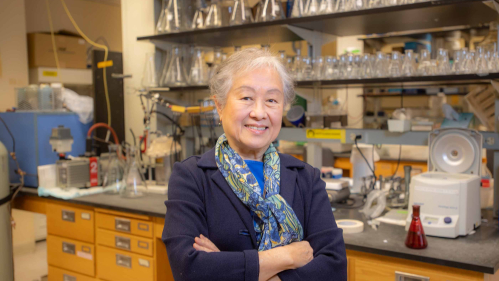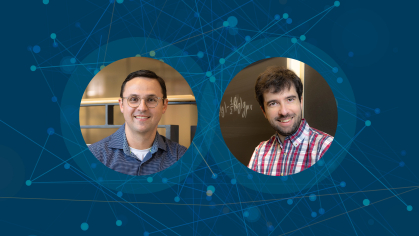Professor of Environmental Microbiology Receives Daniel Gorenstein Memorial Award

Lily Young is honored for her scholarly achievements and service to Rutgers University
Lily Young, a Distinguished Professor of Environmental Microbiology at Rutgers University–New Brunswick, received the Daniel Gorenstein Memorial Award for outstanding scholarly achievement and exceptional service.
Young – a Board of Governors Professor who is a faculty member of the Department of Environmental Sciences at the School of Environmental and Biological Sciences (SEBS) – has conducted research as an environmental microbiologist at Rutgers for more than 30 years.
“Receiving this award is a most unexpected and meaningful recognition from the Rutgers community that I can think of,” said Young. “And coming from my colleagues, it is particularly meaningful and humbling. I am very thankful and a bit overwhelmed.”
Elected to the National Academy of Engineering, among the highest professional distinctions bestowed to engineers, Young has held a number of positions at Rutgers, including associate dean for graduate studies at SEBS, chair of the Department of Environmental Sciences, dean of international programs at SEBS and provost for faculty development and excellence at Rutgers–New Brunswick.
Young is a fellow of the American Association for the Advancement of Science and the American Academy of Microbiology. The professor, who has received more than $20 million in grant funding over the past 25 years, focuses her research on microbial transformation of organics, metals and minerals in the environment.
Young discusses her work and her latest honor.
What’s an example of a real-world impact stemming from your research?
Microbes are the only organisms in our biosphere that can use petroleum hydrocarbons as food and energy for growth. Where, when, which organisms are questions that intrigue me. How does this happen, what are the metabolic pathways for degradation, the enzymes that catalyze the process, the genes that carry the information?
With this knowledge we have been able to show that in many cases gasoline and petroleum contamination in the environment can be cleaned up by taking advantage of naturally occurring microbes to biodegrade the contaminants. This is now an accepted and managed approach for contaminated site remediation that is environmentally benign and less harmful than chemical or physical processes.
What advice do you have for students who are considering a career in science?
There are so many answers to this question and all of them are the right answer. Some students are driven by discovery. Others are looking to solve problems. Still others are fascinated by a personal experience, or by the wonders of our natural world.
If you have an interest, there is without a doubt a fascinating question to be answered and knowledge to be gained. There is always yet another interesting question to ask and another puzzle to solve. In other words, you are constantly learning new things and widening your understanding of the world.
What drives your passion for aiding and guiding the next generation of scientists?
The next generation can build on what our generation has developed, which of course is built on the knowledge of previous generations. With each generation, the tools have increased and improved. The challenges, of course, have also increased. For example, the changing climate is a current and immediate issue that arguably will affect all fields of science now and in the future.
Whatever the field, there will be a way to address some aspect of how to mitigate, manage and curb the impact of climate change. I’m optimistic that the accomplishments of the generation to follow can be transformative.
What most excites you about Rutgers and its mission to grow as a beloved community?
Rutgers has a distinctive quality that makes it a very special place: the great and wonderful diversity of its students, their nationality, ethnicity, background, age and life experiences. Of all the other academic institutions I have been at, this aspect at Rutgers makes it a much richer, more vibrant, more exciting and the most interesting community of students to work with.
Established in 1993 by family, friends and colleagues of Daniel Gorenstein, the award commemorates the late professor’s mathematical research, his exposition of his field and his service to the university. First presented in 1994, the award is given each year to a Rutgers faculty member noted for scholarly achievement and service to the university.
An award ceremony and lecture will be held from 5:30 p.m. to 7:30 p.m. on Thursday, Feb. 15, in the New Jersey Institute for Food, Nutrition, and Health Building, Room 101, 61 Dudley Road, New Brunswick. Attendees may register for the event online.


